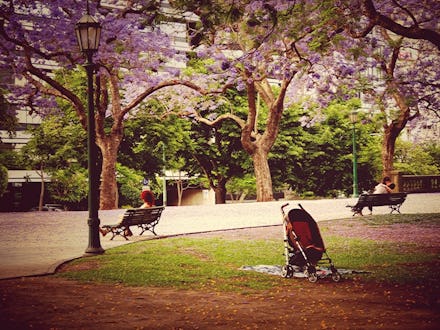One Thing We Need to Remember When We Talk About People Who Don't Have Kids

Society makes a million assumptions about why some people choose not to have children — they are too focused on their careers, they are materialistic, they are inherently selfish. Underlying all those accusations: These people just don't understand or appreciate parenthood.
But the truth, one that gets lost in the debate, is quite the opposite. The decision not to have kids isn't about discounting or dismissing parenting — it's about respecting parenting.
That's the idea put forth by Meghan Daum, editor of the new essay collection Selfish, Shallow and Self-Absorbed: Sixteen Writers on the Decision Not to Have Kids, which explores the many complicated reasons men and women remain childless.
Respecting parenthood from a distance: Fewer people are having kids than ever before. In the United States today, 19% of women ages 40 to 44 are childless, up from 1 in 10 in the 1970s, according to a United Nations report. That "plunge," as the Pew Research Center called it, has accelerated in recent years, with the overall birth rate falling 8% between 2007 and 2010.
The very fact that so many adults live without children has brought the conversation to the fore, stirring up some of the worst judgments of non-parents. Among them is the misconception that childless-by-choice people disrespect the choice to parent and judge those who choose it.
But Daum told Mic that for many, the choice to not have kids reflects serious consideration for how difficult and significant parenthood is. "Saying, 'This is an important and difficult job that should only be undertaken by those who really want to do it,' is a form of paying respect to parents," Daum said.
The decision involves weighing the emotional responsibilities of parenting as well as the financial ones. The U.S. Department of Agriculture estimated the average cost on a middle-income family to raise a kid born in 2013 to be $245,340 — and that's if they stop supporting the child at 18. Then there are lifestyle choices to consider, as adults assess whether the lives they lead will allow them to be the kind of parents they want to be.
Daum's own decision not to have children, she said, comes from wanting to give herself fully to everything she does, and knowing parenting was not one of those things. "I just felt that if I were a parent, I wouldn't be able to give it the enthusiasm it warranted," she said.
Her thought process is more common than we think. The decision to not have kids is rarely made quickly or out of desperation — it's often quite an active one. A 2013 Australian study published in the Journal of Social Inclusion found that a top reason childless women don't have kids is that they've never wanted any.
Tellingly, a 1998 British study by the Family Policy Studies Centre found of childless women and men that "those interviewed took a thoughtful and responsible view of family responsibilities," according to the Joseph Rowntree Foundation. "Yet the respondents had, variously, concluded that it would be undesirable, difficult or impossible to make parenthood part of their own lives."
And as Ellen DeGeneres wrote for People in 2014, "It's a human being, and unless you think you have excellent skills and have a drive or yearning in you to do that, the amount of work that that is and responsibility — I wouldn't want to screw them up!"
Turning judgment into understanding: Despite these facts, the misconception that childless-by-choice people selfishly disrespect parenting itself is one supported by the judgements of both parents and non-parents alike.
"There is a persistent cultural assumption that people who choose not to have children are judging those who do," Daum said. This insecurity based judgment on the part of parents is, unfortunately, sometimes rooted in reality, as non-parents dish back the judgement.
"On the flip side, parents are called 'breeders' and accused of smugness and entitlement and overconsumption," Daum said. "Both of these scenarios are pitifully reductive and contribute to this idea that parents and non-parents are adversaries."
The reality is that, whether or not someone has kids, they need to make the best choice for their own particular situation. "We should see each other as partners in a society where people are free to make the life decisions that are best for them," Daum said. "I think if people just told the truth, which would be some version of, 'It just wasn't for me,' a lot of these judgements would shut down."
"But for some reason saying, 'It's just not for me,' is more taboo than saying you're selfish or want to spend money on vacations rather than school tuition," she continued. "I find that really baffling."
Recognizing all paths: What we really need to do is change the conversation about those who choose not to have kids from one of shame and judgment to one of choice and acceptance. For Daum, that includes bringing men into the conversation in order to recognize the debate for what it is: "a human issue."
That also includes validating the value of non-parents, especially in kids' lives. As Chelsea Handler said in a 2013 interview, "I definitely don't want to have kids. I don't think I'd be a great mother. I'm a great aunt or friend of a mother."
"It's healthy — and I would argue crucial — for children to grow up in a world where they see that there are lots of ways to be a caring, responsible, compassionate adult," Daum explained.
"I know it's a cliche, but it really does 'take a village to raise a child.' And not every villager needs to be a parent," Daum said. "What every villager does need to be is a moral, responsible citizen. And that means having kids because you really want to — not because you think you're supposed to."
That's something we all can respect.